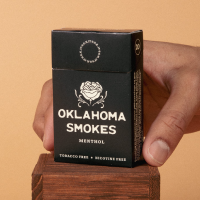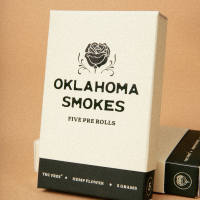Smoking can have drastically negative effects on your day to day life, from your health, to your wallet, and that terrible smell. It may be time to get away from tobacco and search for alternatives.
Two popular alternatives on the market today that match the feel of your old smoking habit are herbal and CBD cigarettes. Choosing to smoke any substance should come with at least a handful of knowledge, so we’re here to do some educatin’.
While both act as a great source to pull away from tobacco use, each does have their differences and advantages.
Why Use Alternatives?
When attempting to step away from tobacco or weed, your body will go through different levels of withdrawal, both physical and mental.
Like most addictive substances, nicotine and THC affect your brain by releasing dopamine, which is responsible for feelings of alertness, focus, motivation, and happiness. Your body generally enjoys these feelings, and over time, would prefer they not stop.
This is why when you smoke a cigarette, you feel less stressed and ready to take on the world.
Unfortunately, the various chemicals found in tobacco are known to damage the body, cause cancer, attack the lungs, and damage the skin to say the least. Plus, nicotine is addictive, and your want to have a smoke will quickly grow into a need for one.
By switching to tobacco alternatives, you are able to continue smoking, while separating yourself from the toxins in traditional cigarettes.
Alternatives to Tobacco & Marijuana

On the path to quitting tobacco or marijuana products and getting away from their addictive compounds, nicotine and THC respectively, you may find yourself looking for smoking alternatives. These alternatives allow you to reduce or eliminate the use of addictive chemicals, while maintaining the physical and social rituals associated with smoking.
While quitting can be stressful, continuing the less harmful components of the habit while stopping the toxic ones can help you stay on the path to quitting.
If the chemical withdrawal becomes too much, using other forms of controllable nicotine and THC such as patches, tinctures, or vapes could give you just enough to place your cravings at ease, while being a viable method to slowly reduce the amount you intake over time.
Herbal Cigarettes
Herbal cigarettes are generally defined as any smokable product containing herbs, but the definition has changed over time.
Original herbal cigarettes were found in China, and involved mixing tobacco with herbs to create a flavorful blend. These blends could be found in a wide range of mixes, some primarily mixed with tobacco, while others were mixed primarily with herbs.
Today, herbal cigarettes commonly refer to just herbs being used in the cigarettes, often with added fillers. These herbs are used in place of tobacco instead of with it, and can be found with just one herb or a blend:
- Passion flower
- Corn silk
- Rose petals
- Lotus leaf
- Licorice root
- Jasmine
- Ginseng
- Red clover flowers
Although tobacco is heavily regulated, herbal cigarettes are not. This means that along with the herbs, you will find a variety of fillers used such as corn silk, dried lettuce, and dried cabbage. Seasonings are also typically added for flavoring.
Are Herbal Cigarettes Safe?
When considering the safety of herbal products, it’s important to remember the range of different herbs and blends that could be used in the cigarette.
Tobacco herb blends use herbs to add flavor, while maintaining certain levels of tobacco. Since these blends maintain levels of nicotine, it’s safe to assume that while these may taste better than traditional cigarettes, they are not healthier.
Whenever any plant is burned, the fats and physical makeup of the plant produces byproducts such as tar, and releases carbon monoxide. This means herbal products release these harmful components similar to how tobacco does, and no evidence has proven the release is any less.
The lack of regulations surrounding herbal cigarettes also creates some concern about the safety of the product. While using herbs such as lavender and clove have been beneficial, there has been no trials or evidence leading to the idea that smoking these herbs would be any more beneficial than diffusing their essential oils, using them in topical forms like lotions and creams, or even consuming them through food like lavender ice cream.
Further concerning the health profile of herbal cigarettes, the Federal Trade Commission (FTC) has taken action against herbal cigarettes in the past when select companies claimed that herbal cigarettes posed less of a threat to health than tobacco cigarettes.
CBD Cigarettes

When looking for a tried and true alternative to tobacco and a perfect alternative to marijuana, CBD cigarettes allow you to light up, while also gaining various wellness benefits.
CBD cigarettes are a form of hemp cigarettes, and while a product may be advertised as a hemp cigarette, it may not have CBD.
Tricky? You bet. Let us explain.
Hemp is a form of cannabis sativa that is highly regulated, and must federally contain less than 0.3% THC. While the THC levels have a close eye kept on ‘em, there are no guidelines to how much CBD will be in a given plant. This means one plant may have almost no CBD, while another may have high CBD levels. So, a hemp cigarette may or may not contain CBD.
The good news? CBD cigarettes contain no addictive substances, making them a great option to get you away from THC and nicotine.
When considering CBD smokes as an alternative to marijuana, the taste and aroma are nearly identical. This can be relieving for someone attempting to reduce their use of THC since the feel and taste can help to satisfy cravings.
Are CBD Cigarettes Safe?
For thousands of years, civilizations around the world have used hemp-based products to support their overall health and reap wellness benefits from CBD’s ability to soothe and relax the body.
The previous confusion between hemp and marijuana over the years has created contradicting statements. At one point in time, these two very different plants were considered the same.
Since the re-legalization of hemp in 2018 with the U.S. Farm Bill, hemp production and use have been widely tested in an effort to understand its huge potential. This includes the research and manufacturing of oils, tinctures, capsules, wellness products, and -- you guessed it -- as a tobacco-free cigarette alternative.
Cannabis, and the effects its 100+ cannabinoids have on your body, has remained a focal point of research with the growing legalization of medical and recreational marijuana, which has also encouraged further research and understanding of CBD. With more research being conducted every day, gaining continuous knowledge from reputable resources can keep you up to date on CBD uses, safety, and potentials.
Why Are the Effects of Smoking Different Across Tobacco, Herbs, and CBD?
When smoking tobacco, marijuana, or hemp, you need to consider how the different compounds and chemicals within each plant are affected by temperature changes.
A great example of these changes include THCA and THC. Marijuana has no psychoactive effects directly from the plant, as THC sits in its “raw” form, THCA or (tetrahydrocannabinolic acid). As marijuana is heated through a process known as decarboxylation, i.e. when it’s smoked above 220 degrees Fahrenheit, the acid part is removed (i.e. the A in THCA), creating infamous THC. Only then does the THC have psychoactive traits.
Even though an herb may be good for you when used in tea, food, and lotions, it may not be beneficial when smoked. This becomes apparent as certain herbs create high levels of carbon monoxide when heated. Carbon monoxide is created when fuels such as gasoline or plant matter fail to fully ignite. This toxic gas is flavorless and odorless, and is thought to be one of the major medical issues with tobacco use, too.
When testing cannabis and tobacco, it was found that cannabis produced:
- 30% less tar
- 1900% less ammonia
- 450% less nitrogen oxides
- 500% less hydrogen cyanide
- 500% less aromatic amines
So, what’s the big difference between herbal cigarettes and hemp cigarettes?

While herbal and hemp cigarettes are both considered all-natural tobacco alternatives to help you quit smoking, they couldn’t be further apart from one another.
Herbal cigarettes are not regulated, and haven’t been found to be safe or beneficial to your health.
On the other hand, hemp and CBD products are heavily regulated and tested, ensuring you receive a safe alternative to tobacco use, with many companies offering lab results proving the purity of their CBD. Plus, with the constant ongoing research and testing of cannabis-based products only growing, you can stay up-to-date on the recent findings and possible uses of hemp.
It’s time to step away from tobacco and the addictive effects of nicotine, and light up your first CBD cigarette from Oklahoma Smokes, a tried and true smoke you’ll be glad to take over herbs any day.
Sources
Asian Herbal-Tobacco Cigarettes | PMC






